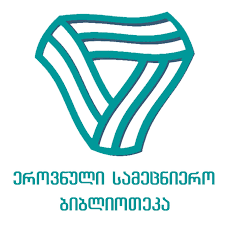გთხოვთ, გამოიყენოთ ეს იდენთიფიკატორი ამ ერთეულის ციტირებისთვის ან ბმულისთვის:
https://openscience.ge/handle/1/452| DC ველი | მნიშვნელობა | ენა |
|---|---|---|
| dc.contributor.advisor | ბახტაძე, გურამ | ka |
| dc.contributor.author | ხაჯიშვილი, საბინა | ka |
| dc.date.accessioned | 2019-11-08T12:55:15Z | - |
| dc.date.available | 2019-11-08T12:55:15Z | - |
| dc.date.issued | 2019 | - |
| dc.identifier.uri | https://openscience.ge/handle/1/452 | - |
| dc.description.abstract | The Narodniks (Georgian: ხალხოსნობა), was a political movement of the Russian middle class in the 19th century, involved in revolutionary uprisings against tsarism. This ideology was known as Narodnichestvo (народничество), from the Russian word “народ” (narod), “people, folk”, so it is sometimes translated as “peopleism” or, more commonly, “populism”. A common slogan among the Narodniks was “хождение в народ” (khojdenie v narod), meaning “going to the people”. Though their movement achieved little in its own time, the Narodniks were in many ways the intellectual and political pioneers of the socialists-revolutionaries who went on to greatly influence Russian history in the 20th century. The narodniks became a widespread movement in Georgia as well. People from the big cities traveled to the country side to spread ideas and news concerning the struggle against the occupant force, the Tsar. Narodnism arose after the emancipation of the serfs in 1861 Tsar Alexsander 2, which signaled the end of feudalism in Russia. Arguing that freed serfs were being sold into wage slavery, in which the bourgeoisie had replaced landowners, Narodnism aimed to become a political force opposed to the phenomenon. | en |
| dc.description.abstract | ხალხოსნობა — XIX საუკუნეში საშუალო წრის საზოგადოებაში გავრცელებული პოლიტიკური მოძრაობაა. XIX საუკუნეში რუსეთში თავი იჩინა ეგრეთწოდებულმა ნაროდნიკობამ, რომელიც მიზნად ისახავდა გლეხებში გასვლას და მათ შორის თვითმპყრობელობის წინააღმდეგ მიმართული იდეების გავრცელებას. ამ მოძრაობამ დიდი გამოხმაურება გამოიწვია საქართველოში. ქალაქიდან მიდიოდნენ სოფლად ხალხში, შეჰქონდათ ახალი აზრები და მიზნები. ამ მოძრაობას უწოდებდნენ „ხოჟდენიე ვ ნაროდ” ( „ხალხში სიარულს“), და ასევე „ზემლია ი ვოლია“ ("მიწა და თავისუფლება“), რომლის მიზანიც იყო სამეფო ხელისუფლების დამხობა. ხალხოსნობა წამოიწყო 1961 წელს ალექსანდრე მე-2-ს მიერ ბატონყმობის და ფეოდალიზმის გაუქმების შემდგომ. განთავისუფლებული მონები იყვნენ დამატებით დაზარალებული დაქვემდებარებული დაქირავებული მონობით, რომელიც ახალ კაპიტალისტურ ეკონომიურ წყობას ექვემდებარებოდა . ხალხოსნობა იყო პირდაპირ მიმართული ახალი არასამართლებლივი წყობის გაუქმებაში. | ka |
| dc.language.iso | ka | - |
| dc.subject | ქართული ხალხოსნობა | ka |
| dc.subject | სოფრომ მგალობლიშვილი | ka |
| dc.subject | მოგონებები | ka |
| dc.title | ქართული ხალხოსნობა - სოფრომ მგალობლიშვილი | ka |
| dc.type | master thesis | en |
| dc.type | სამაგისტრო ნაშრომი | ka |
| thesis.degree.name | Master of Humanitarian Science | en |
| thesis.degree.name | ჰუმანიტარულ მეცნიერებათა მაგისტრი | ka |
| thesis.degree.level | 1 | - |
| thesis.degree.discipline | ფილოლოგია | ka |
| dc.contributor.institution | საქართველოს საპატრიარქოს წმიდა ტბელ აბუსერისძის სახელობის სასწავლო უნივერსიტეტი | ka |
| dc.contributor.faculty | ჰუმანიტარულ მეცნიერებათა და განათლების ფაკულტეტი | ka |
| item.languageiso639-1 | ka | - |
| item.cerifentitytype | Publications | - |
| item.cerifentitytype | Publications | - |
| item.openairetype | master thesis | - |
| item.openairetype | სამაგისტრო ნაშრომი | - |
| item.openairecristype | http://purl.org/coar/resource_type/c_bdcc | - |
| item.openairecristype | http://purl.org/coar/resource_type/c_18cf | - |
| item.fulltext | With Fulltext | - |
| item.grantfulltext | open | - |
| ჩანს კოლექციებში: | ჰუმანიტარულ მეცნიერებათა და განათლების ფაკულტეტი (სამაგისტრო ნაშრომები) | |
ფაილები ამ ერთეულში:
| ფაილი | აღწერა | ზომა | ფორმატი | |
|---|---|---|---|---|
| samagistro xajishvili.pdf | ქართული ხალხოსნობა - სოფრომ მგალობლიშვილი | 522.88 kB | Adobe PDF | დათვალიერება-გახსნა |
CORE Recommender
გვერდის დათვალიერება
278
checked on May 18, 2024
გადმოწერა
1,311
checked on May 18, 2024
Google ScholarTM
გადამოწმება
ერთეულები ციფრულ საცავში დაცულნი არიან საავტორო უფლებით, ყველა უფლების დაცვით, თუ სხვაგვარი რამ არაა მითითებული.

